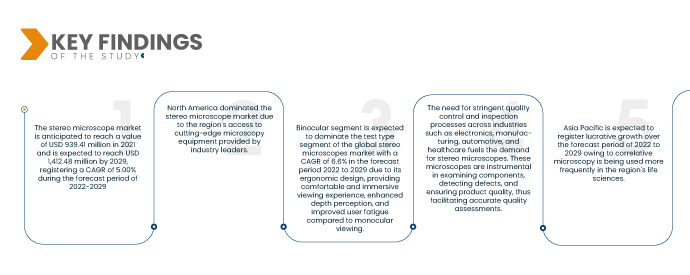Der Markt für Stereomikroskope verzeichnet weltweit ein positives Wachstum und eine steigende Akzeptanz. Stereomikroskope bieten verbesserte Visualisierung, Vergrößerung und Tiefenwahrnehmung und ermöglichen so präzise Beobachtungen und Analysen. Sie finden Anwendung in der wissenschaftlichen Forschung, der Bildung, dem Gesundheitswesen und der Industrie. Der Markt profitiert von technologischen Fortschritten, wie beispielsweise der Integration digitaler Bildgebung, die Funktionalität und Benutzerfreundlichkeit verbessert. Zusätzlich wird das Marktwachstum durch die steigende Nachfrage nach Qualitätskontroll- und Inspektionsprozessen in allen Branchen vorangetrieben. Insgesamt bietet der Markt für Stereomikroskope wertvolle Werkzeuge für detaillierte Untersuchungen und Analysen in verschiedenen Bereichen.
Den vollständigen Bericht finden Sie unter https://www.databridgemarketresearch.com/reports/global-stereo-microscope-market
Data Bridge Market Research prognostiziert für den globalen Markt für Stereomikroskope ein Wachstum von 939,41 Millionen US-Dollar im Jahr 2021 und ein Wachstum von 1.412,48 Millionen US-Dollar bis 2029. Dies entspricht einer durchschnittlichen jährlichen Wachstumsrate (CAGR) von 5,00 % im Prognosezeitraum 2022–2029. Die kontinuierlichen Fortschritte in der wissenschaftlichen Forschung, insbesondere in Bereichen wie Biologie, Chemie und Materialwissenschaften, treiben die Nachfrage nach Stereomikroskopen voran. Diese Mikroskope bieten verbesserte Visualisierungs- und Vergrößerungsmöglichkeiten, die es Forschern ermöglichen, komplexe Details zu untersuchen und präzise Beobachtungen durchzuführen.
Wichtigste Ergebnisse der Studie
Die steigende Nachfrage in den Schwellenländern dürfte das Marktwachstum ankurbeln
In Schwellenländern steigt die Nachfrage nach Stereomikroskopen aufgrund zunehmender Industrialisierung und Investitionen in Forschung und Entwicklung. Diese Länder bauen ihre Gesundheitsinfrastruktur und Bildungseinrichtungen aus, was zu einem Bedarf an fortschrittlichen Mikroskopielösungen führt. Dies eröffnet Marktwachstumschancen, da Unternehmen und Institutionen in diesen sich schnell entwickelnden Regionen präzise Visualisierungs- und Vergrößerungsmöglichkeiten für wissenschaftliche Forschung, Diagnostik, Qualitätskontrolle und Bildungszwecke suchen.
Berichtsumfang und Marktsegmentierung
Berichtsmetrik
|
Details
|
Prognosezeitraum
|
2022 bis 2029
|
Basisjahr
|
2021
|
Historische Jahre
|
2020 (Anpassbar auf 2014 – 2019)
|
Quantitative Einheiten
|
Umsatz in Millionen USD, Mengen in Einheiten, Preise in USD
|
Abgedeckte Segmente
|
Testtyp (Monokular, Binokular, Trinokular), Designtyp (Greenough-Typ, Paralleloptik-Typ), Zoomtyp (Motorzoom, manueller Zoom), Anwendung (Industrie, Biowissenschaften), Endbenutzer (Klinik und Labore, Forschungsinstitute, Industrieinspektion und Wissenschaft)
|
Abgedeckte Länder
|
USA, Kanada und Mexiko in Nordamerika, Deutschland, Frankreich, Großbritannien, Niederlande, Schweiz, Belgien, Russland, Italien, Spanien, Türkei, Restliches Europa in Europa, China, Japan, Indien, Südkorea, Singapur, Malaysia, Australien, Thailand, Indonesien, Philippinen, Restlicher Asien-Pazifik-Raum (APAC) im Asien-Pazifik-Raum (APAC), Saudi-Arabien, Vereinigte Arabische Emirate, Südafrika, Ägypten, Israel, Restlicher Naher Osten und Afrika (MEA) als Teil des Nahen Ostens und Afrikas (MEA), Brasilien, Argentinien und Restliches Südamerika als Teil von Südamerika.
|
Abgedeckte Marktteilnehmer
|
Nikon Corporation (Japan), Cole-Parmer Instrument Company, LLC. (USA), Unitron (USA), Vision Engineering Ltd. (Großbritannien), KEYENCE CORPORATION (Japan), ZEISS International (Deutschland), Meiji Techno (USA), Scienscope International Inc. (USA), Thermo Fisher Scientific Inc. (USA), Seiwa Optical America Inc. (USA), KERN & SOHN GmbH (Deutschland), Celestron, LLC. (USA), Boeckel + Co (Gmbh + Co) (Deutschland), A.KRÜSS Optronic GmbH (Deutschland), Walter Products (Indien), Olympus Corporation (Japan), Aven Tools (USA), Leica Microsystems (Deutschland), Guilin Maite Optical Instrument Co., Ltd. (China) und andere
|
Im Bericht behandelte Datenpunkte
|
Zusätzlich zu den Einblicken in Marktszenarien wie Marktwert, Wachstumsrate, Segmentierung, geografische Abdeckung und wichtige Akteure umfassen die von Data Bridge Market Research kuratierten Marktberichte auch ausführliche Expertenanalysen, Patientenepidemiologie, Pipeline-Analysen, Preisanalysen und regulatorische Rahmenbedingungen.
|
Segmentanalyse:
Der Markt für Stereomikroskope ist nach Testtyp, Designtyp, Zoomtyp, Anwendung und Endbenutzer segmentiert
- Der Markt für Stereomikroskope wird je nach Testtyp in monokulare, binokulare und trinokulare Mikroskope unterteilt. Das binokulare Segment wird voraussichtlich im Prognosezeitraum 2022 bis 2029 mit einer durchschnittlichen jährlichen Wachstumsrate (CAGR) von 6,6 % das Testtypsegment des globalen Stereomikroskopmarktes dominieren. Dies ist auf das ergonomische Design zurückzuführen, das ein komfortables und intensives Seherlebnis, eine verbesserte Tiefenwahrnehmung und eine geringere Ermüdung des Benutzers im Vergleich zur monokularen Betrachtung bietet.
- Der Markt für Stereomikroskope wird nach Bauform in Greenough- und Paralleloptik-Mikroskope unterteilt. Das Greenough-Mikroskopsegment wird voraussichtlich im Prognosezeitraum 2022 bis 2029 mit einer durchschnittlichen jährlichen Wachstumsrate (CAGR) von 6,6 % den globalen Markt für Stereomikroskope dominieren. Dies ist auf seine überlegene optische Leistung, die verbesserte Tiefenwahrnehmung und die verbesserte Bildqualität zurückzuführen. Es ermöglicht präzise und detaillierte Beobachtungen und ist daher die bevorzugte Wahl für verschiedene Anwendungen.
Im Jahr 2022 wird erwartet, dass das Greenough-Typ-Segment das Design-Typ-Segment des globalen Marktes für Stereomikroskope dominieren wird
Im Jahr 2022 wird das Greenough-Typ-Segment voraussichtlich das Design-Typ-Segment des globalen Stereomikroskopmarktes dominieren. Dies ist auf seine verbesserte Tiefenwahrnehmung, überlegene optische Leistung und höhere Bildqualität zurückzuführen. Es ist eine beliebte Wahl für viele Anwendungen, da es präzise und gründliche Beobachtungen mit einer durchschnittlichen jährlichen Wachstumsrate (CAGR) von 6,6 % im Prognosezeitraum 2022 bis 2029 ermöglicht.
- Der Markt für Stereomikroskope wird je nach Zoomtyp in motorisierte und manuelle Zoomgeräte unterteilt. Aufgrund seiner Benutzerfreundlichkeit und Vielseitigkeit wird das Segment der motorisierten Zoomgeräte voraussichtlich im Prognosezeitraum 2022 bis 2029 mit einer durchschnittlichen jährlichen Wachstumsrate (CAGR) von 7,3 % den globalen Markt für Stereomikroskope dominieren. Die Vergrößerung lässt sich mithilfe motorisierter Bedienelemente einfach anpassen und bietet präzise und effiziente Zoomfunktionen für verschiedene Anwendungen und Beobachtungsanforderungen.
- Der Markt für Stereomikroskope ist nach Anwendungsbereichen in Industrie und Biowissenschaften unterteilt. Es wird erwartet, dass das Segment Biowissenschaften im Prognosezeitraum 2022 bis 2029 mit einer durchschnittlichen jährlichen Wachstumsrate (CAGR) von 7,0 % den globalen Markt für Stereomikroskope dominieren wird, da es in der biologischen Forschung, der Medizin und medizinischen Tests weit verbreitet ist. Stereomikroskope ermöglichen die detaillierte Untersuchung von Objekten, Zellstrukturen und biologischen Prozessen und fördern so die Erforschung der Biowissenschaften.
Im Jahr 2022 wird erwartet, dass das Segment Life Science das Anwendungssegment des globalen Marktes für Stereomikroskope dominieren wird
Im Jahr 2022 wird das Life-Science-Segment voraussichtlich den Anwendungsbereich des globalen Stereomikroskopmarktes dominieren, da es in der biologischen Forschung, der Pharmaindustrie und der medizinischen Diagnostik weit verbreitet ist. Stereomikroskope ermöglichen die detaillierte Untersuchung von Proben, Zellstrukturen und biologischen Prozessen und unterstützen den Fortschritt in den Life-Science-Bereichen mit einer durchschnittlichen jährlichen Wachstumsrate (CAGR) von 7,0 % im Prognosezeitraum 2022 bis 2029.
- Der Markt für Stereomikroskope ist nach Endnutzern in Klinik und Labore, Forschungsinstitute, Industrieinspektion und Wissenschaft segmentiert. Das Segment Industrieinspektion wird voraussichtlich im Prognosezeitraum 2022 bis 2029 mit einer durchschnittlichen jährlichen Wachstumsrate (CAGR) von 6,1 % das Endnutzersegment des globalen Stereomikroskopmarktes dominieren, da es eine entscheidende Rolle in der Qualitätskontrolle, Fehlererkennung und Präzisionsmessung in Fertigungs- und Industrieprozessen spielt. Stereomikroskope bieten eine präzise und detaillierte Visualisierung für effiziente Inspektion und Analyse.
Hauptakteure
Data Bridge Market Research erkennt die folgenden Unternehmen als die wichtigsten Akteure auf dem Markt für Stereomikroskope an: Cole-Parmer Instrument Company, LLC. (USA), Unitron (USA), Vision Engineering Ltd. (Großbritannien), KEYENCE, ZEISS International (Deutschland), Meiji Techno (USA), Nikon Corporation (Japan), KERN & SOHN GmbH (Deutschland), Celestron, LLC. (USA), Boeckel + Co (Gmbh + Co) (Deutschland)
Marktentwicklung
- Im Jahr 2021 wurden die Rekonstruktionstechnologien ZEISS DeepRecon Pro und ZEISS PhaseEvolve von Carl Zeiss veröffentlicht. Diese Produkte sind Teil der 3D-Röntgenplattform ZEISS Xradia. Diese Tools ermöglichen den Einsatz von KI zur Verbesserung der Datenerfassung und -analyse.
Regionale Analyse
Geografisch betrachtet sind dies die folgenden Länder, die im Marktbericht für Stereomikroskope abgedeckt sind: USA, Kanada und Mexiko in Nordamerika, Deutschland, Frankreich, Großbritannien, Niederlande, Schweiz, Belgien, Russland, Italien, Spanien, Türkei, Restliches Europa in Europa, China, Japan, Indien, Südkorea, Singapur, Malaysia, Australien, Thailand, Indonesien, Philippinen, Restlicher Asien-Pazifik-Raum (APAC) in Asien-Pazifik (APAC), Saudi-Arabien, Vereinigte Arabische Emirate, Südafrika, Ägypten, Israel, Restlicher Naher Osten und Afrika (MEA) als Teil des Nahen Ostens und Afrikas (MEA), Brasilien, Argentinien und Restliches Südamerika als Teil von Südamerika.
Laut Marktforschungsanalyse von Data Bridge:
Nordamerika ist die dominierende Region auf dem Stereomikroskopmarkt im Prognosezeitraum 2022 bis 2029
Die Dominanz Nordamerikas auf dem Markt für Stereomikroskope lässt sich auf mehrere Faktoren zurückführen. Die Region profitiert von der Präsenz führender Marktteilnehmer, die fortschrittliche Mikroskopiesysteme mit Spitzentechnologien anbieten. Diese Verfügbarkeit hochwertiger und innovativer Produkte verschafft Nordamerika einen Wettbewerbsvorteil. Darüber hinaus verfügt Nordamerika über ein starkes Forschungs- und Entwicklungsökosystem, eine robuste Gesundheitsinfrastruktur und einen florierenden Industriesektor, der die Nachfrage nach Stereomikroskopen antreibt. Der Schwerpunkt der Region auf technologischem Fortschritt und Investitionen in wissenschaftliche Forschung tragen zusätzlich zu ihrer Marktdominanz bei.
Der asiatisch-pazifische Raum wird im Prognosezeitraum 2022 bis 2029 voraussichtlich die am schnellsten wachsende Region im Stereomikroskopmarkt sein.
Im asiatisch-pazifischen Raum (APAC) wird von 2022 bis 2029 ein deutliches Wachstum des Marktes für Stereomikroskope erwartet, vor allem aufgrund der zunehmenden Verbreitung der korrelativen Mikroskopie in den Biowissenschaften. Die korrelative Mikroskopie kombiniert verschiedene Bildgebungsverfahren, um umfassende Einblicke in biologische Proben zu ermöglichen. Der zunehmende Fokus der Region auf die Biowissenschaftsforschung, Fortschritte in der Gesundheitsinfrastruktur und steigende Investitionen in wissenschaftliche Studien tragen zur verstärkten Anwendung der korrelativen Mikroskopie in der Region bei. Dieser Trend treibt die Nachfrage nach Stereomikroskopen an und sichert der Region im Prognosezeitraum ein signifikantes Marktwachstum.
Für detailliertere Informationen zum Marktbericht für Stereomikroskope klicken Sie hier – https://www.databridgemarketresearch.com/reports/global-stereo-microscope-market













